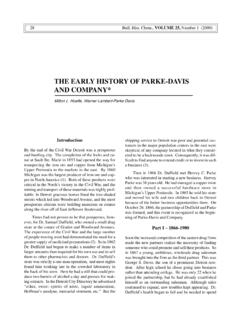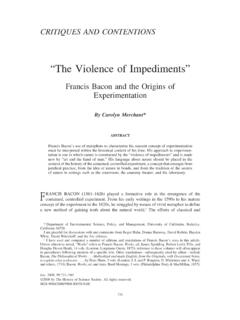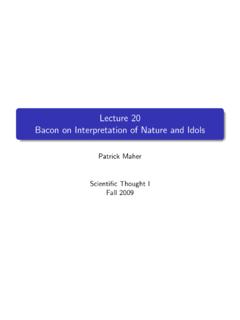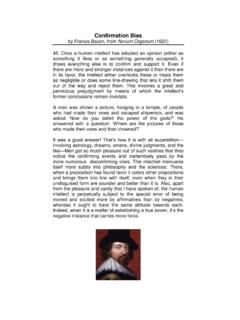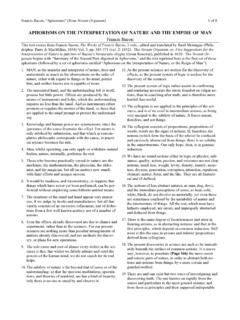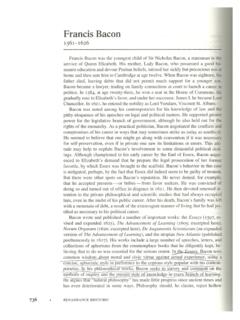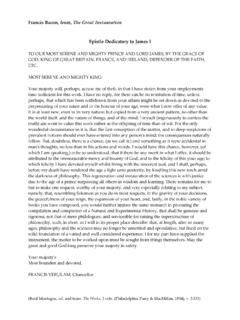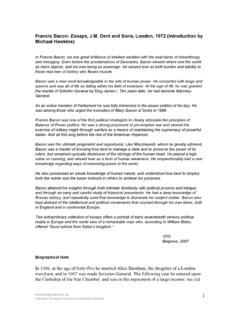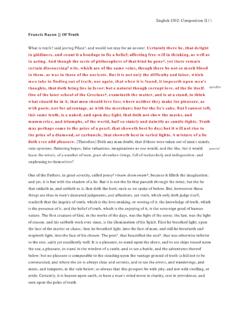Transcription of FRANCIS BACON: AN ALCHEMICAL ODYSSEY THROUGH …
1 Bull. Hist. Chem., VOLUME 28, Number 2 (2003)65 FRANCIS bacon : AN ALCHEMICAL ODYSSEYTHROUGH THE NOVUM ORGANUMP edro Cintas, University of Extremadura, SpainOne of the most fascinating and thought-provokingperiods in the history of chemistry is the coexistence inWestern Europe of the ancient alchemy (having mostlikely arisen from Hellenistic and Arabic influences)and the rational, scientific chemistry we know its own nature, this is a rather indeterminate periodranging from the Renaissance (around the 15th and 16thcenturies) to early in the 19th century when chemicalgold making transmutation was conclusively refutedby scientific evidence. Although the origin of alchemyis uncertain, it had a double aspect: on the one hand itwas a practical endeavor aimed to make gold or silverfrom ordinary and abundant metals such as lead or cop-per, whereas on the other it was a cosmological theorybased on the interaction between man and the , basic goals of alchemy correspond to those ofastrology in an attempt to discover the relationship ofman to the stars and how to exploit that knowledge toobtain wealth, health and immortality (1).
2 There is nodoubt, however, that alchemy largely contributed to thedevelopment of chemistry with a variety of novel sub-stances and techniques. Superficially speaking, thechemistry of alchemy involved a complicated succes-sion of combinations or heatings of several materials,operations supposed to be within reach of any initiatedperson, with the ultimate objectives of obtaining goldor an elixir of immortality (2). Unfortunately, a clear-cut distinction between alchemy and the then emerg-ing field of chymistry or chemistrie (the Old Englishwords related to the present chemistry) cannot be made(3, 4).During that time, especially the 17th century, somephilosophers and artists were interested in alchemicalpractices, although they did not waste their effort andmoney in pursuit of the philosopher s stone and otheralchemists dreams. Among these natural philosophers,the figure of Sir FRANCIS bacon (1561-1626) shouldchiefly be mentioned. bacon is best known as a phi-losopher of science and a master of the English tongue(5).
3 In the former case, many of his writings were con-cerned with the natural sciences and the theory of sci-entific method, which he considered incomplete and tak-ing little account of observation while giving too muchcredit to tradition and authority. He had an acute powerof observation and advocated the repetition of experi-ments as a means to verify hypotheses, rather than toconsider the latter ones as if they were incorrigible axi-oms. THROUGH his famous Idols (doctrines or attitudesof mind that are seemingly corroborated by empiricalobservations, but in fact ideas that are forced to be inaccord with a favored theory), bacon ridiculed the learn-ing methodology of his was a prolific writer, even during his politi-cal career as a member of Parliament and later LordChancellor in the service of James I, a period spanningmore than 35 years (6). He devoted much more time tonatural sciences and philosophy after his fall from powerin 1621. Two major books constitute the core of bacon sphilosophy of science: De Dignitate et AugmentisScientiarum ( On the Dignity and Advancement ofLearning, 1605), and especially the Novum Organum( The New Organon or Method, 1620) after the Greekword organon meaning instrument (7).
4 bacon in factprepared several drafts of the latter book between 1608and 1620. Other works also contain abundant references66 Bull. Hist. Chem., VOLUME 28, Number 2 (2003)to empiricism, collections of observations, and interpre-tation of natural phenomena. Such works, along withthe two above-mentioned works, constitute what Baconcalled the Great Instauration (8).The Novum Or-ganum (NO) is, how-ever, his most impor-tant and lasting opus,intended to be a collec-tion of novel directionsfor the interpretation ofNature. Globally con-sidered, this work, alsopublished in two books,is no more than a seriesof short essays calledaphorisms which dealwith an enormous vari-ety of subjects withconsiderations oftenrooted in metaphysics,not to say that somekind of occultism isalso present in histhought. It is, however,possible to discoverBacon s achievementsin science whichemerge from his re-markable power of ob-servation. He de-scribed with admirabledetail phenomena takenfrom both animate andinanimate bodies, real-ized his own measure-ments, and suggestedfurther experiments.
5 Inaddition, he gave newinterpretations to suchnatural phenomena, of-ten challenging the ac-cepted theories of his present manuscript is a brief journey throughthe Novum Organum with emphasis on chemical descrip-tions and experiments. The aim is to present bacon sinteresting work on physico-chemical phenomena andhis particular vision of s Alchemy: Currents of ThoughtAt first glance it is difficult to understand the interest ofBacon toward Chymistry (3,4) beyond that of a naturalphilosopher occupied inthe observation of phe-nomena. Unlike otherbranches of natural phi-losophy, chemistry wasnot deemed worthy ofacademic study; and inmost cases it was consid-ered a mere collection ofcraftsmen s recipes. Thissituation has been ana-lyzed in detail byPrincipe in his compre-hensive biography ofRobert Boyle, which alsogives an overview of thehistory of alchemy andchemistry in the 17th cen-tury (9). bacon s works, andthe Novum Organum isno exception, were influ-enced, at least to someextent, by the differentsystems of thought thatprevailed in England inthe 16th and 17th centu-ries: Aristotelian scholas-ticism, humanism in-spired by Plato and anumber of Italian phi-losophers, and largely deviatedfrom scholasticism, al-though in the time Baconbegan to write an officialcriticism of Aristotle sphilosophy was focusedon logic and not, as bacon s critique was to do, on knowl-edge of nature.
6 bacon , however, was closer to human-ism and shared with it the idea that knowledge of naturederives from observation and perception by the senses(10). bacon also added the key element of experimen-tal verification, , observations worthy to support theo-ries must be repeatable (11).Bull. Hist. Chem., VOLUME 28, Number 2 (2003)67 The third significant mode of thought in theBaconian philosophy is occultism or esotericism: thatis, the search for a mystical relationship between manand the cosmos, as in ALCHEMICAL speculations, and theknowledge of magical or unnatural forces. Occultismwas prevalent in Latin Europe for several centuries andflourished especially with the work and legacy ofParacelsus (1493-1541), who sought out the most learnedfigures of practical alchemy, not only to discover themost effective methods of chemical therapy, but also,and importantly, to discover the latent forces of natureand how to use them (12). Occultism and its Paracel-sian influences were also rooted in England at the timeof bacon and his contemporaries, Robert Fludd (1574-1637) being one of the most salient exponents (13, 14).
7 A vision of bacon as a mystic has been supported bysome scholars (15), who regard bacon s writings assteeped in alchemy and magic. However, most laymenwill not find much of a mystical character in the NovumOrganum, even though bacon often alludes to Paracelsusand his theories and experiments (vide infra). A consid-erable portion of the Novum Organum is devoted to an-swer how scientists should proceed in order to increaseknowledge of the natural world. In doing so, Baconconcentrates on the how rather than the why ofAristotelianism. Most hypotheses and explanations pro-vided by bacon THROUGH the second book of the NovumOrganum contain little theological and esoteric was arguably no great friend of alchemists,although he was able to pick up the pluses of alchemy,especially the value and technical importance of certainchemical substances. bacon did not reject any experi-mental evidence provided by the alchemists but ratherthe way of making things, paying attention to minutedetails not involved directly in the result of their experi-ments (16, 17, 18).
8 The empirical school of philosophy yields more de-formed and monstrous ideas than the sophistical orrational, because it is based, not on the light of com-mon , but on the narrow and obscure foun-dation of only a few A notable ex-ample of this is to be found in the alchemists andtheir is true that alchemists have some achievementsfrom their labors, but these came by chance, inciden-tally, or by some variation of experiments, such asmechanics are accustomed to make, and not from anyart or Those too who have applied them-selves to natural magic, as they call it, have madefew discoveries, and those trivial, and more like de-ceptive alchemist nurses eternal hope, and when the thingdoes not succeed, he blames error of his own, and inself-condemnation thinks he has not properly under-stood the words of his art or of its authors, where-upon he turns to traditions and auricular whispers; orelse thinks that in his performance he has made someslip of a scruple in weight or a moment in time, where-upon he repeats his experiments severe as these criticisms may be viewed, they werealso expressed by bacon s predecessors who were swornenemies of the malpractices of alchemists and, never-theless, they also advocated the use of chemicals inmedicine (Paracelsus) or art.
9 For instance, Leonardo daVinci (1452-1519) was acquainted with the frauds ofalchemists (19):The false interpreters of nature declare that quicksil-ver is the common seed of every metal, not remem-bering that nature varies the seed according to thevariety of the things she deserves to produce in s natural philosophy is frequently impregnatedwith chemical studies and analyses of observable prop-erties. His rather eclectic approach is often obscure asBacon sometimes recurs to Aristotelian elements, whileother discussions are focused on Paracelsian principles,or both, which were invoked by alchemists in the 17thcentury. The oldest Aristotelian vision that matter wascomposed of air, water, earth, and fire, each represent-ing a particular property or quality, was widely acceptedin Western Europe by natural philosophers. Aristote-lian philosophy also suggested that such elements com-pared one with the other were in a proportion of ten toone, an assumption that bacon considered to be false(20):The ratio of density of the so-called elements is arbi-trarily fixed at ten to one; and other dreams of thatkind.
10 And that sort of vanity is rife not only in dog-mas but also in simple alludes to primary elementary qualities that canbe inferred from Aristotelian elements such as moist,dry, hot, and cold, whereas he also suggests the exist-ence of occult properties and specific virtues named sec-ondary qualities. These constitute a series of terms uti-lized by physicians at that time such as attraction, re-pulsion, attenuation, dilation, maturation, etc., which,on the other hand, are close to Paracelsian concepts (21).The Aristotelian elements are also discussed byBacon in his Clandestine Instances, that is, those thatshow the nature at its weakest, in its rudiments, or hid-den aspects (22):68 Bull. Hist. Chem., VOLUME 28, Number 2 (2003)Although air plainly does not attract air nor water,water in whole bodies, nevertheless a bubble placednear another bubble more easily dissolves than if thatsecond bubble were not there, because of the ten-dency to coition of water with water, and air with Clandestine Instances of this kind present them-selves conspicuously in the small and subtle portionsof also agreed with the principles identified by Ara-bic alchemists, who conceived of sulfur and mercury asbasic constituents of matter, especially in metals.
